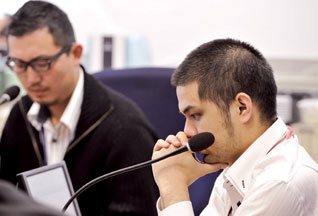|
Earthquake, tsunami, nuclear disaster in Japan:
Indirect impact on Lanka greater than direct impact
Achieving expected economic goals is becoming increasingly difficult
as external shocks are creating more and more challenges, economic
analysts said. Global financial and economic crisis, global food crisis,
Middle East political crisis and the latest-the earth quake, tsunami and
nuclear disaster in Japan, all these have an extremely negative impacts
on emerging economies under the present globalised environment, they
said.
 |
 |
|
Foreign currency traders
await orders at a foreign exchange market in Tokyo on Thursday.
The Japanese yen continued to surge in early Asian trade,
hitting a new record high of 76.52 yen against the US dollar
since World War II following Japan’s disastrous earthquake and
tsunami. AFP |
Commenting on the impact of the disaster in Japan on the Sri Lankan
economy, President of the Sri Lanka Economics Association Prof. A.D.V.de
S. Indraratna said that the impact of the Japanese crisis on the Sri
Lankan economy will be on many fronts.
Since Japan is one of the biggest donors to Sri Lanka, especially
providing development grants and low rate credit, the crisis will affect
the much needed capital for future development programs.
Also, Japan is one of our main trading partners as well as investors.
Trade and FDI from Japan may also affect us, he said.
Japan is the largest bilateral donor of Sri Lanka and by the end of
2009 our outstanding debt to Japan was Rs. 426,769 million. It was 24.4
percent of total external debt of the country and 62.3 percent of the
total outstanding bilateral debt.
Analysts said the indirect impact of the Japanese disaster will be
greater compared to its direct impact on Sri Lanka.
The crisis in the world’s second largest economy will make shock
waves in the recovery of the global economy.
According to agency reports the combined impact of the triple
disasters in Japan the earthquake, tsunami and the nuclear crisis has
led to a sharp sell-off in asset markets. Stocks, gold, oil and
commodity markets have all been hit.
Excerpts from comments published in the Wall Street Journal and
Reuters..
The markets have over reacted.
For instance Fukushima is still regarded as a category four accident
on a scale of zero to seven compared with Chernobyl, a category seven
accident.
However the reaction of the Japanese stock market has been much more
brutal than after the 1995 Kobe earthquake.
Assuming that the radiation threat is contained, the most plausible
scenario is an initial contraction of the Japanese economy, followed by
a rebound as rebuilding gets underway.
The sharp falls in the commodity markets are based on the contraction
in Japanese demand, but part of the reason is also the reaction of
speculative funds fleeing the sector.
The initial knee-jerk reaction has seen hot money shifting to safe
havens such as the Swiss Franc and to US treasuries.
Longer term the US Federal Reserve believes the recovery is on a
firmer footing. Data for February from the purchasing managers’ indices
seem to suggest the same: They show that the global economy expanded at
its fastest pace since April 2006.
Globally, both manufacturing and services are showing good growth.
The composite leading indicators of OECD point to continuing
expansion in most developed countries. One of the questions is whether
the expansion in the US will continue even after the withdrawal of
monetary stimulus later this year.
But at the moment, economic activity is robust.
These conditions are unlikely to be significantly altered by the
fallout from Japan.
In fact, the reduced crude oil prices work in favour of countries
that import their requirements, such as India or the US.
The longerterm concern, however, is whether the nuclear disaster in
Japan sparks a move away from nuclear energy, which could lead to a
dramatic rise in demand for oil and in oil prices.
While a reassessment of safety in nuclear plants is called for, it
would be unfortunate if a one-off nuclear accident resulting from an
earthquake in a well-known seismic zone and a tsunami should put off the
construction of nuclear plants in an energy-hungry global economy.
According to Reuters Japan’s triple disaster could result in losses
of up to $200 billion for the world’s third largest economy but the
global impact remains hard to gauge five days after disaster.
The disaster is expected to hit Japanese output sharply over the
coming months, but economists warned it could result in a deeper
showdown if power shortages prove significant and prolonged, delaying or
even scotching the “v-shaped” recovery that followed the 1995 Kobe
earthquake.
Most believe the direct economic hit will total between 10-16
trillion yen ($125-$200 billion), resulting in a contraction in second
quarter gross domestic product (GDP) but a sharp rebound in the latter
half of 2011 as reconstruction investment boosts growth.
“The economic cost of the disaster will be large,” economists at JP
Morgan said.
“There has been substantial loss to economic resources, and economic
activity will be impeded by infrastructure damages (like power outages)
in the weeks or months ahead.”
Japanese stocks suffered their worst two-day rout since the 1987
crash on Monday and Tuesday, losing a whopping $626 billion in value,
before rebounding 5.7 percent on Wednesday as hedge funds rushed to
cover short positions.
But traders remained skittish, swayed by each new development at the
stricken Fukushima power plant and alert to signs Japanese companies and
insurers could sell sizeable foreign assets and repatriate funds to
cover the costs of the nuclear crisis, quake and tsunami.
High-yield bonds and U.S. Treasuries top the list of vulnerable
assets should the triple disaster of earthquake, tsunami and nuclear
breakdown prompt Japanese investors to bring overseas funds back home,
analysts say.
Although the damage to infrastructure has been severe, some of the
biggest risks to the economy may come from indirect market consequences
of the disaster, such as a rise in the Japanese yen.
The yen surged to an all-time high against the dollar after the Kobe
earthquake in 1995 as Japanese firms pulled funds home.
The dollar has fallen 3 percent against the yen since the disaster
and is now close to the low hit after Kobe.
The direction of the yen could have a big impact on Japanese
carmakers like Toyota Motor Co, Nissan Motor and Honda Motor, which
build between 22 and 38 percent of their cars at home.
HSBC Chief Economist Stephen King said it was still too early to put
a figure on the economic costs as the scale of the disaster was not yet
clear.
The area of Japan affected by the tsunami produces around 4.1 percent
of the country’s GDP, suggesting first-round economic effects could be
limited, he said. But with the fate of the Fukushima nuclear reactors
still unclear, Japan may not have felt the full force of the disaster
yet.
Japanese national debt at around 200 percent of GDP is already higher
than any country except Zimbabwe, and the recovery and rebuilding
required after the quake can only exacerbate this.
A quarter of tax revenue in Japan is already taken up by servicing
the debt mountain and this is only sustainable because the interest paid
on it is so low.
If the rates on Japanese Government Bonds (JGB) rose considerably
then default could be a real possibility.
The way this could affect JGBs is a hard one to call: uncertain times
usually see people gravitating toward the safety of bonds, said the
Tokyo trader, but the amount of money that will be needed for
reconstruction is going to be huge, and this will inevitably make the
Japanese national deficit even worse.
The yen lost strength just after the quake, as might be expected
after such a major disaster, but has since actually gone back up to
higher than it had been trading prior to Friday.
The same phenomenon occurred after the massive Kobe earthquake in
1995, caused by Japanese government, companies and investors selling
overseas assets and bringing money back home.
If the Japanese government does have to repatriate money to pay for
rebuilding, a likely source will be U.S. Treasury bonds of which it is a
major holder putting more pressure on the straining U.S. public
finances. |

